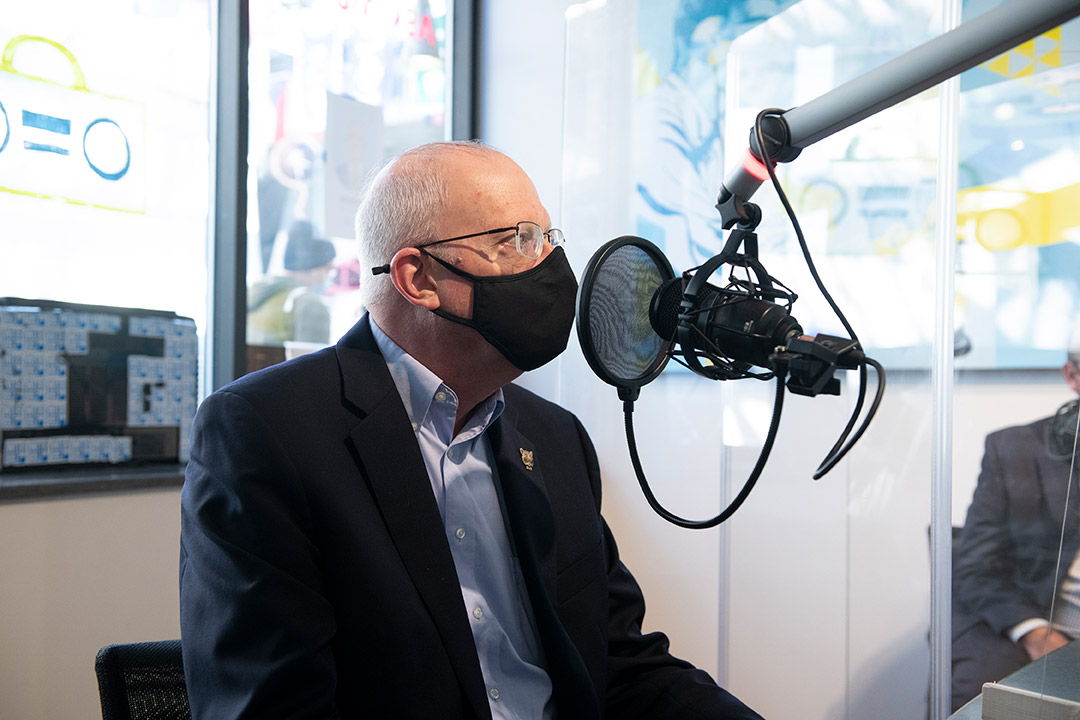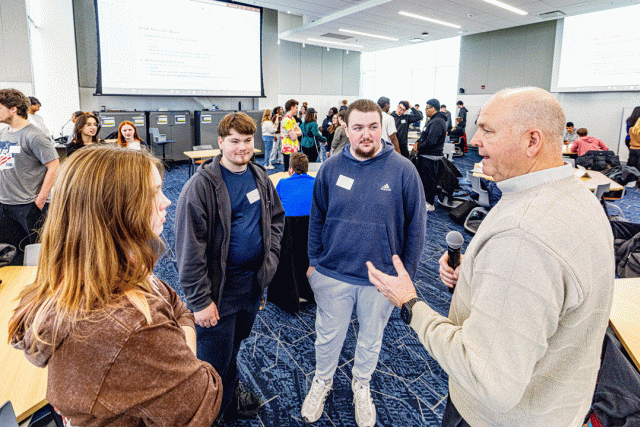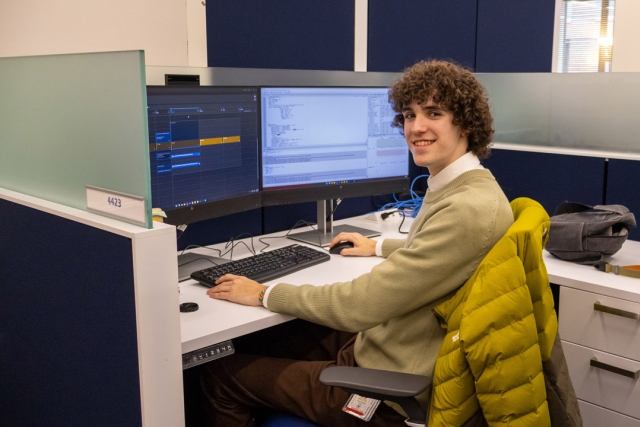President Munson sees changes in spring semester, including 'recharge' days
A. Sue Weisler
RIT President David Munson answers questions about how the semester is progressing and plans for spring semester during an “Ask Munson” interview on WITR-FM (89.7) radio Wednesday.
RIT President David Munson said at least two break days will be added to next semester’s academic calendar to help students cope with the loss of spring break and continued stress surrounding COVID-19 during the pandemic.
Munson, in his “Ask Munson” series on WITR-FM (89.7), also talked Wednesday about whether students are following safety guidelines, whether classes could be made pass/fail, making the campus more welcoming to diverse students, and plans for students’ return to campus next semester—probably sometime after Jan. 21.
Munson called the efforts RIT and its students, faculty, and staff have taken to minimize the risk of spreading COVID-19 “successful” this semester, with 14 cases since the beginning of classes Aug. 19 with a campus community of nearly 20,000 people.
“We’ve made it to the halfway point,” he said, but cautioned that we have seen some new cases and so everyone must remain vigilant by continuing distancing, wearing masks, and frequently washing their hands.
“I am so proud of our students and the way you all have handled yourselves,” Munson said. “You’re following the rules. At other campuses, lots of students are not following the rules and a number of schools have had to send everybody home and quite a number have had to go online. We’re just so proud of where we are. Are we worn out? Yes. There’s getting to be some drudgery. Are we tired of the facemasks? Yes. But it’s working. Let’s just take this a week at a time. Before we know it, we’ll be at the end of the semester. You have to look at that positive side of it.”
Munson explained there were no breaks built into this semester because university leadership wanted students to be able to finish their on-campus instruction before Thanksgiving break. He didn’t want to have students required to come back to campus after they’ve been home and potentially contracted the virus.
And he said they couldn’t have started this semester earlier because they were making infrastructure improvements to help prevent spread of COVID.
“So we ended up with a situation where we don’t have a break,” Munson said. “We realize that’s a lot of pressure on everyone. For the spring semester, we will build in at least a couple of break days.”
He said a team is evaluating alternative calendars for spring semester and will be conveying dates to students very soon.
“I know for sure we’ll have at least a couple of break days during the spring semester and maybe more than that,” he said. “We have more time to plan and we’ve got a little bit more leeway in terms of when we start this coming semester because we’ve already got the safety infrastructure in place on campus.”
Munson said the start of spring semester will depend on how many break days are given, but there also are other considerations.
He said he expects students, faculty, and staff will again need to be tested for COVID-19 prior to returning to campus for spring semester. RIT is requiring that students, faculty, and staff who will be on campus for any reason receive a seasonal flu vaccination by the start of spring semester. Reducing the amount of flu will simplify the identification of those in the RIT community who have COVID and also will free up capacity in the health system for those with COVID.
But whether a COVID-19 vaccine will be required won’t be determined for some time as university leadership reserves judgment until it is proven that a COVID vaccine is safe and effective based on the quality of the science. “We’re expecting probably more than one vaccine, and we’re going to be waiting for New York state and their assessment on which of these vaccines they would recommend as being both safe and effective,” Munson said. “Until we get to that point, I don’t think it’s possible for us to say that we would actually require a COVID vaccine.”
Munson was asked about the student PawPrints petition asking for a pass/fail option in their classes this semester.
“I am hearing from students getting tired of watching a screen all day long and I am, too,” he said, saying the pass/fail option ought to be considered. He said the provost will be speaking with the Academic Senate about the possibility.
Another topic involved the statue of Frederick Douglass, installed Friday in the Student Alumni Union near the Fireside Lounge, and four new flags for display: the Black Lives Matter flag; the Pride Flag; the Haudenosaunee Flag representing the six Native American nations that originally occupied the region where RIT’s campus sits; and the Sign Union Flag, representing RIT’s deaf and hard of hearing community.
“No matter where you come from or who you are, we want you to feel like you’re part of the community and know that you belong here,” Munson said.
Even amidst COVID, Munson said RIT is focused on the future, with the continuation of design and construction projects.
“The Innovative Maker and Learning Complex is absolutely on track,” he said, with “monster-size” maker spaces for project teams, many classrooms, and performing arts venues and practice spaces. “It’s looking like almost the entire library is going to be renovated as part of the project, and there will be big connections between the new construction and the Wallace Library, so this is shaping up really nicely.”
And later this month, the Global Cybersecurity Institute will open, Munson said. A formal dedication is being planned for March.
In addition, a performing arts center is in the design phase, and some new athletic facilities also are under design, although some projects will be delayed by financial issues associated with the pandemic.
“It won’t be long before you’re going to see major construction on our campus, really oriented at creating the future of RIT,” Munson said.



